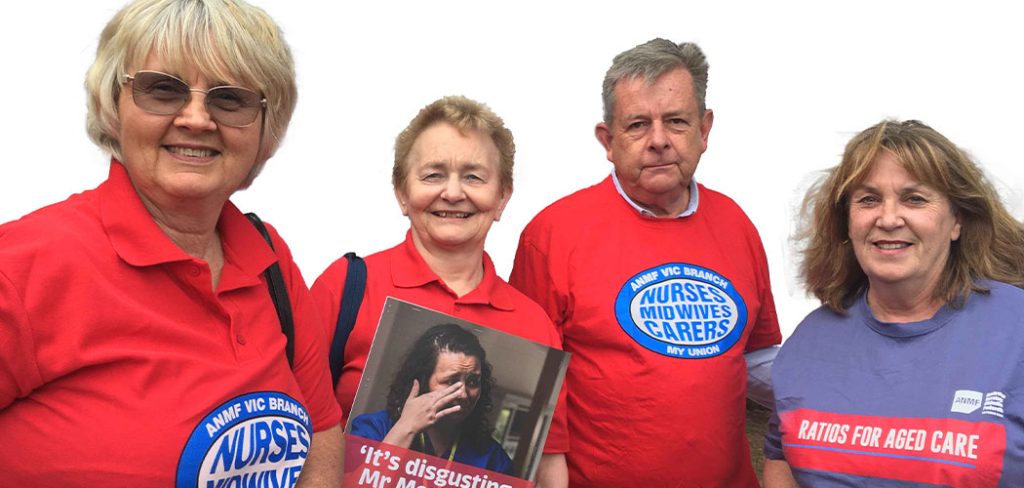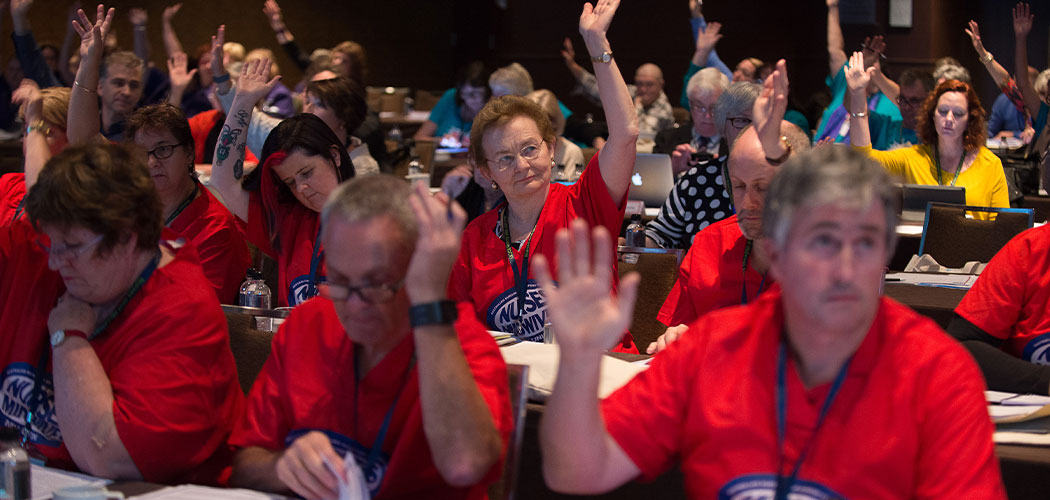Nurses and midwives, the backbone of healthcare, provide essential patient-centred care across the health system, yet experience diverse challenges.
Active involvement in the ANMF’s state and territory branches empowers them as advocates for change. This includes improving wages, safety, patient care, and influencing healthcare policy, benefiting both health professionals and people.
Retired Victorian registered nurses Liz Barton and Cecilia Webster share a lot in common. Both trained to become nurses at St Vincent’s Hospital.
Both have links to Australia’s wartime nursing heroine, Vivian Bullwinkel, who offered them advice and gave them inspiration as early career nurses entering the profession, particularly to always stand up for patients.
And both, after crossing paths unwittingly throughout their careers, would end up working in the same palliative care unit at Peninsula Health in Frankston.
But it’s perhaps their longtime involvement in the ANMF (Vic Branch), as active, informed, union members, helping to lead campaigns promoting, defending and fighting for improved conditions across the professions, and the broader health sector, that solidifies their connection the most.
Cecilia, who took part in numerous ANMF (Vic Branch) led actions during her career, counts the 2011 ‘Respect Our Work’ nine-month campaign, the longest industrial campaign in Victorian nursing and midwifery history, which included bed closures and stop work in a bid to protect nurse/midwife to patient ratios first achieved in 2000, as part of public sector enterprise agreement negotiations, as one of the more memorable wins.
“It was about protecting safe, quality, patient care,” recalls Cecilia, of thwarting the then Bailleu Government’s plan to remove ratios.

“And the only way you can get safe, quality, patient care is to have enough people to do the job. So, we knew we had to do whatever we could to save those ratios at the time.”
Liz, a former ANMF (Vic Branch) job rep and occupational health and safety (OHS) rep of the year, agrees.
“We were determined to keep them [ratios] because what has happened over the years, the patients have become sicker, and they’ve got many more comorbidities, and you are flat stick all the time,” she says.
Like many other active union members, Liz worked relentlessly to support the ‘Respect Our Work’ campaign, often sacrificing family time for the greater good. Back then, as Facebook was emerging, she used the new social media tool to help connect with members, communicate information, and mobilise action.
In years to come, the Andrews Government’s historic Victorian Safe Patient Care Act was passed, paving the way for the state to become only the second jurisdiction in the world to enshrine mandated ratios in law. For Liz, it also offered the opportunity to contribute to shaping the inclusion of palliative care staffing levels within the ratios for the first time.
As colleagues on the palliative care unit, Liz and Cecilia also advocated strongly for safer working conditions and rights. By standing together, they helped address common workplace issues such as understaffing, heightened workloads, health and safety, infection control issues, and wages and conditions.
“It was becoming very dangerous, not just for us, but for the patients,” recalls Cecilia, of the workload issues at the time.
“As a palliative care unit, we had 15 patients at the time, but you could have 10, 20, 30, or 40 relatives if someone’s dying. All their families come in, and you’ve only got five nurses on a late shift. You just couldn’t spread yourself, so you couldn’t get all the work done, such as symptom management, pain relief, the basic care.”
In more recent years, and even in retirement, Liz and Cecilia extended their union activism to another longstanding ANMF priority – aged care reform. The pair are key members of grassroots lobby group Aged Care Reform Now, a community of older people, families and friends, current and retired aged care workers, and others passionate about fixing the sector.
Both have advocated for aged care reform for many years, having been exposed to the shortcomings across the system through nursing and personal experiences with family members.
Cecilia, who has taken part in various aged care Inquiries and research projects since the problematic 1997 Aged Care Act was introduced, says the point of difference with Aged Care Reform Now is that it is focused on exposing problems, and finding solutions too.
Since it was established, the group has achieved influential change throughout the aged care reform process by writing research reports and making submissions to Inquiries.
As real aged care reform has finally begun to be implemented under the Albanese Government, highlighted by RN 24/7 and mandated care minutes legislation, Aged Care Reform Now continues to advocate for change.
“It’s piecemeal,” Liz says of the improvements.
“We’re trying to undo the damage that was done by the 1997 Aged Care Act.
“The public, who don’t have any involvement with aged care, all they see is the glossy brochures. They’re looking at a retirement village picture. They’re not looking at the reality of 80% of residents having cognitive disability, having Parkinson’s, the falls.”
According to Cecilia, the nursing profession always has to fight to be heard when it comes to their work and wellbeing. Unless nurses continue to be activists, things won’t change.
“Nurses at the bedside, and in the community, they see it. They see the reality of poor management. They see the reality of not enough staff. They’re feeling the effects of burnout, even pre-COVID, the burnout was already revealing itself and people were looking at leaving the profession. If nurses realised that they can change things, by engaging in the political process and lobbying policymakers about their work and speaking out, then maybe things could just be that little bit better.”
Liz says she saw the difference that can be made first-hand when, in 2018, palliative care ratios were finally implemented through the ward.
“It was almost a state of shock – I didn’t have to do unpaid overtime anymore,” she says.
Aged care is a different, much more complex issue, however, due to system privatisation and the complexities of it being a federally legislated environment that will require lengthy ongoing activism.
After decades in nursing, both Liz and Cecilia maintain that the only way to achieve real workforce change is to join your union and become active members.
“They [nurses] should get involved because people who make policy about what you do, you’ve got to be able to stand up and say ‘No, that doesn’t work’. If it’s not working, you need to stand up and say so. And you need to be able to be safe to do that,” suggests Cecilia.
“Nursing is the best career. It’s a lifelong career,” adds Liz.
“You can change fields. It’s intellectually stimulating. You get to work with a diverse group of people.
“But you have to be actively involved [in your union]. The fantastic thing about the ANMF (Vic Branch) is that we’ve had wonderful leadership and we’ve had generations of nurses who’ve said – we can do better.”








